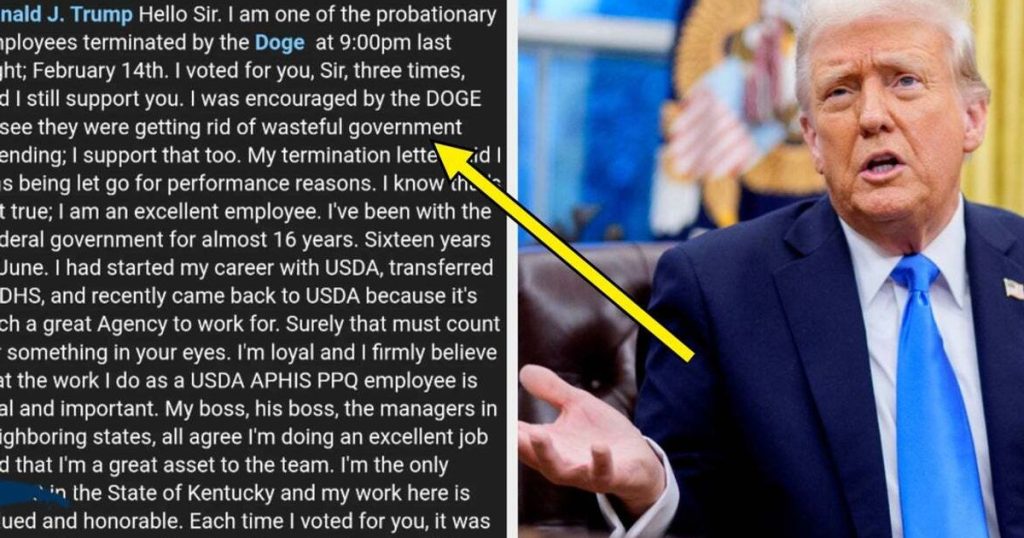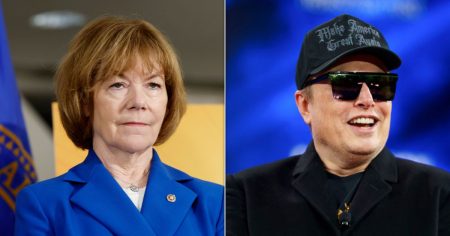The Trump Administration’s Mass Layoffs: A Valentine’s Day Shock
On Valentine’s Day, the Trump administration made headlines for a series of mass layoffs targeting probationary staff at two U.S. Department of Agriculture (USDA) research agencies. This move, reported by Reuters, marked another chapter in the administration’s broader efforts to reduce government spending and streamline federal agencies. The USDA, a cornerstone of American agriculture and food safety, found itself at the center of this controversy. The department’s mandate is vast: ensuring the safety of food production, supporting farmers, maintaining rural infrastructure, and promoting sustainability efforts to conserve land. Its role is not just bureaucratic; it is essential to the nation’s food security and agricultural backbone. Yet, on that fateful evening, several probationary employees received termination letters, leaving them stunned and heartbroken.
A Worker’s Plea to President Trump
Among those laid off was a federal employee who claimed to have dedicated nearly 16 years of their career to public service. In an open letter addressed to President Donald Trump, the individual expressed their dismay and disbelief at being let go, despite their loyalty to the administration. The letter, which circulated widely on social media platforms like X (formerly Twitter), garnered over 3 million views and sparked a mix of sympathy and skepticism. The employee, who identified as a staunch Trump supporter, wrote: “I voted for you, Sir, three times, and I still support you.” They expressed pride in their work and emphasized their contributions to the USDA’s mission, particularly in their role as a PPQ (Plant Protection and Quarantine) employee. The letter also highlighted their unique position as the only specialist in their field within the state of Kentucky, underscoring the value they brought to the agency.
The employee’s termination letter cited “performance reasons” as the cause for their dismissal, but they vehemently disagreed with this assessment. “I know that’s not true; I am an excellent employee,” they wrote, pointing to their long-standing service and the glowing reviews from their superiors. Despite their loyalty to the administration and its policies, including efforts to curb “wasteful government spending,” the employee felt betrayed by the sudden termination. They implored President Trump to intervene, hoping their dedication and contributions might sway his decision. “Surely that must count for something in your eyes,” they pleaded.
A Divided Response: Sympathy vs. Pragmatism
The public’s reaction to the letter was sharply divided. While some expressed empathy for the terminated employee, others adopted a more pragmatic stance, framing the layoffs as a necessary step toward fiscal responsibility. One commenter wrote, “This is business, people. You don’t sacrifice a country with bankruptcy to let people keep a job. They are very employable. Does it suck? Yes, but it’s a necessary evil.” This sentiment reflected a broader acceptance of the administration’s cost-cutting measures, even when they resulted in personal hardship for individual workers.
Others questioned the employee’s expectations, wondering if they believed their support for Trump would grant them special treatment. “Do these people think they are going to get an exception because they are Trumpers?” one person asked. This line of reasoning highlighted the perceived irony of the situation: the employee had voted for a president who campaigned on reducing government size and spending, only to find themselves on the receiving end of those policies. “I hear you,” one commenter wrote, “but all along in his campaign, he proclaimed all he was going to do. You believed him… so here you are, you voted for it.”
The Bigger Picture: Trump’s Campaign Promises and Their Fallout
The layoffs at the USDA serve as a microcosm for the broader debate over government spending and the consequences of political decisions. President Trump’s campaign promise to “drain the swamp” and cut wasteful spending resonated with many voters, including the terminated employee. However, the reality of these policies has often meant tough choices, such as reducing the federal workforce and consolidating agencies. While some supporters applaud these moves as necessary steps toward efficiency, others are left grappling with the personal costs of such decisions.
The terminated employee’s story raises important questions about loyalty, accountability, and the human impact of political decisions. It also shines a light on the complexities of supporting a political agenda that, in theory, aligns with one’s values but, in practice, may result in unintended consequences. As the nation continues to grapple with the challenges of governance, stories like this remind us that policy decisions are never made in a vacuum—they have real-world implications for real people.
Reflections on Loyalty, Service, and the Future of Federal Employment
The Valentine’s Day layoffs at the USDA are a stark reminder of the fragile nature of federal employment, particularly during periods of political transition or administrative restructuring. For the terminated employee, their 16 years of service and unwavering support for the administration offered little protection against the broader goals of the Trump administration. Their story, while unique in its details, is not isolated; it reflects a broader trend of federal workers facing uncertainty as agencies are reshaped to align with new priorities.
As the nation moves forward, this incident invites a deeper conversation about the balance between fiscal responsibility and employee welfare. While reducing government spending may be a laudable goal, it is equally important to consider the human cost of such actions. The terminated employee’s plea to President Trump serves as a poignant reminder of the people behind the policies—the dedicated public servants who often find themselves caught in the crossfire of political decisions. Their story is one of loyalty, service, and resilience, but also of disillusionment and the search for answers in an uncertain landscape.















